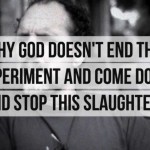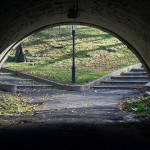We run our website the way we wished the whole internet worked: we provide high quality original content with no ads. We are funded solely by your direct support. Please consider supporting this project.
What is the significance of Numbers 16:41–48?
The day following the Korah incident (see vs. 20–35), the Israelites rebelled against Moses again, this time because they blamed him for the death of those who were judged the day before (vs. 41). The Lord was very angry because of this and said to Moses and Aaron, “Get away from this congregation, so that I may consume them in a moment” (vs. 45). People immediately began to die from a plague (vs. 46). Moses prayed while Aaron quickly “made atonement” for their sins (vs. 47) “and the plagued was stopped” (vs. 48).
The view that the future is eternally settled in God’s mind has the effect of undermining the honesty of God’s expressed intention to judge Israel and the power of prayer to change God’s mind as it is depicted in this passage.
Category: Q&A
Tags: Open Theism, Q&A
Topics: Open Theism
Verse: Numbers 16
Related Reading

The Hexagon of Opposition
Throughout the western philosophical and theological tradition, scholars have assumed that the future can be adequately described in terms of what will and will not happen. In this essay I, Alan Rhoda and Tom Belt argue that this assumption is mistaken, for the logical contradictory of will is not will not but might not. Conversely,…

Divine Wisdom
Why doesn’t God end it all and stop the slaughter? Why does God allow suffering and evil to go on so long? Here, Greg offers two possible answers to these questions. Option A is that all evil somehow is designed by God and somehow brings glory to him. But Greg thinks Option B is a better explanation, and it involves…

Support for Open Theism from Science and Experience
I have discussed the scriptural support that depicts the future as partially open and that God knows it as such. I do this in God of the Possible. If a position is true, every avenue of reflection ought to point in its direction, including science. What follows are two more “pointers” to the view that the…

Open Theism and the Nature of the Future
In this philosophical essay Alan Rhoda, Tom Belt and I argue that the future cannot be exhaustively described in terms of what will and will not happen, but must also be described in terms of what may and may not happen. The future, in other words, is partly open. The thesis is defended against a…

Isn’t Open Theism outside of historic orthodoxy?
The Church has never used one’s view of divine foreknowledge as a test for orthodoxy. And while the open view has always been a very minor perspective, it has had its defenders throughout Church history and it has never been called “heresy” (until in mid 1990s when some started using this label). According to some…

How do you respond to Proverbs 21:1?
“The king’s heart is a stream of water in the hand of the Lord; he turns it wherever he wills.” Calvinists sometimes argue that this passage teaches that everything every government official ever does is the result of the Lord turning their heart. In light of the hideous things many government officials have done (e.g.…
